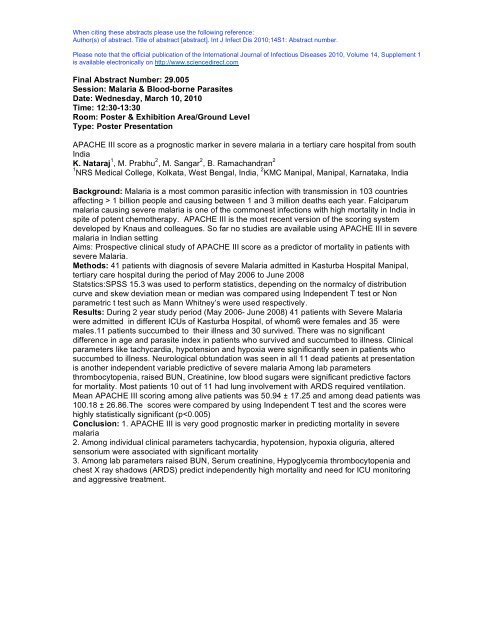14th ICID - Poster Abstracts - International Society for Infectious ...
14th ICID - Poster Abstracts - International Society for Infectious ...
14th ICID - Poster Abstracts - International Society for Infectious ...
You also want an ePaper? Increase the reach of your titles
YUMPU automatically turns print PDFs into web optimized ePapers that Google loves.
When citing these abstracts please use the following reference:<br />
Author(s) of abstract. Title of abstract [abstract]. Int J Infect Dis 2010;14S1: Abstract number.<br />
Please note that the official publication of the <strong>International</strong> Journal of <strong>Infectious</strong> Diseases 2010, Volume 14, Supplement 1<br />
is available electronically on http://www.sciencedirect.com<br />
Final Abstract Number: 29.005<br />
Session: Malaria & Blood-borne Parasites<br />
Date: Wednesday, March 10, 2010<br />
Time: 12:30-13:30<br />
Room: <strong>Poster</strong> & Exhibition Area/Ground Level<br />
Type: <strong>Poster</strong> Presentation<br />
APACHE III score as a prognostic marker in severe malaria in a tertiary care hospital from south<br />
India<br />
K. Nataraj 1 , M. Prabhu 2 , M. Sangar 2 , B. Ramachandran 2<br />
1 NRS Medical College, Kolkata, West Bengal, India, 2 KMC Manipal, Manipal, Karnataka, India<br />
Background: Malaria is a most common parasitic infection with transmission in 103 countries<br />
affecting > 1 billion people and causing between 1 and 3 million deaths each year. Falciparum<br />
malaria causing severe malaria is one of the commonest infections with high mortality in India in<br />
spite of potent chemotherapy. APACHE III is the most recent version of the scoring system<br />
developed by Knaus and colleagues. So far no studies are available using APACHE III in severe<br />
malaria in Indian setting<br />
Aims: Prospective clinical study of APACHE III score as a predictor of mortality in patients with<br />
severe Malaria.<br />
Methods: 41 patients with diagnosis of severe Malaria admitted in Kasturba Hospital Manipal,<br />
tertiary care hospital during the period of May 2006 to June 2008<br />
Statstics:SPSS 15.3 was used to per<strong>for</strong>m statistics, depending on the normalcy of distribution<br />
curve and skew deviation mean or median was compared using Independent T test or Non<br />
parametric t test such as Mann Whitney’s were used respectively.<br />
Results: During 2 year study period (May 2006- June 2008) 41 patients with Severe Malaria<br />
were admitted in different ICUs of Kasturba Hospital, of whom6 were females and 35 were<br />
males.11 patients succumbed to their illness and 30 survived. There was no significant<br />
difference in age and parasite index in patients who survived and succumbed to illness. Clinical<br />
parameters like tachycardia, hypotension and hypoxia were significantly seen in patients who<br />
succumbed to illness. Neurological obtundation was seen in all 11 dead patients at presentation<br />
is another independent variable predictive of severe malaria Among lab parameters<br />
thrombocytopenia, raised BUN, Creatinine, low blood sugars were significant predictive factors<br />
<strong>for</strong> mortality. Most patients 10 out of 11 had lung involvement with ARDS required ventilation.<br />
Mean APACHE III scoring among alive patients was 50.94 ± 17.25 and among dead patients was<br />
100.18 ± 26.86.The scores were compared by using Independent T test and the scores were<br />
highly statistically significant (p
















